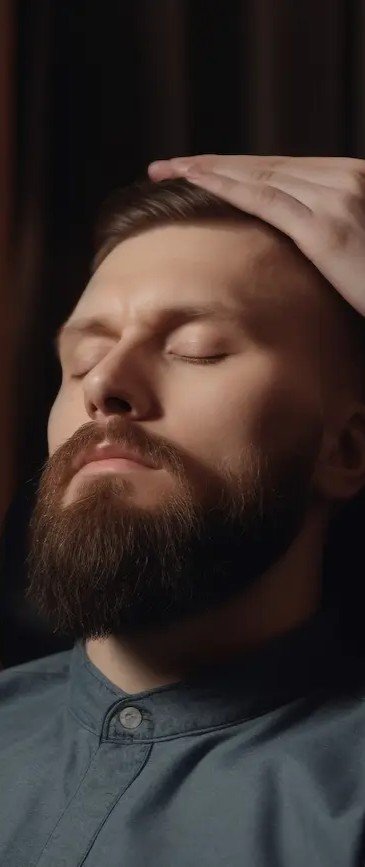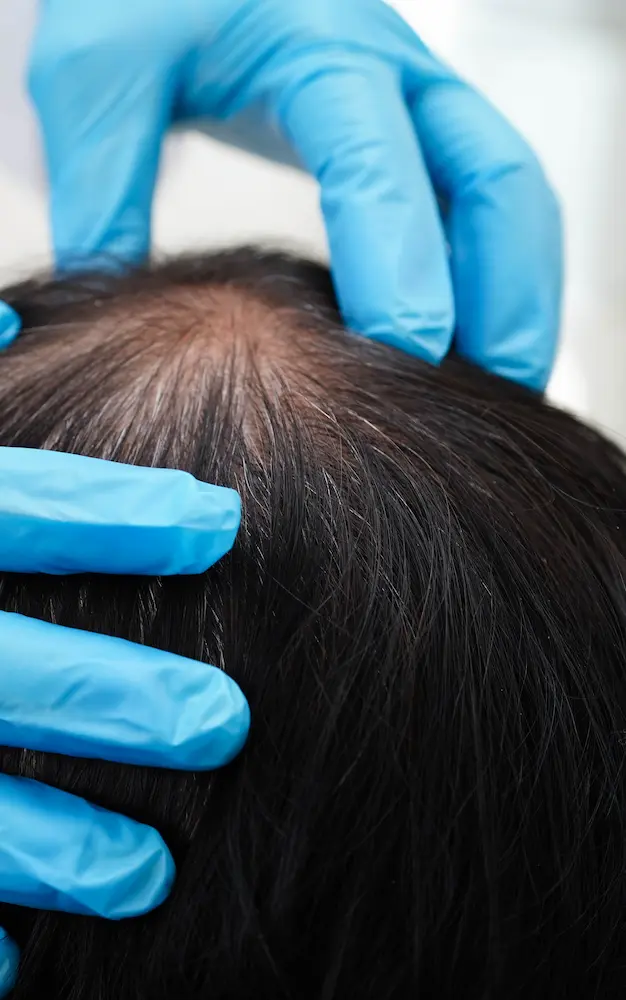How Stress Triggers Hair Loss
Chronic stress creates a destructive cycle with hair loss – stress causes hair shedding, which creates more stress, leading to further hair loss. Understanding this connection is crucial for effective treatment and prevention.
Telogen Effluvium This condition pushes hair follicles into the resting phase prematurely, causing widespread thinning 2-4 months after a stressful event. Unlike male pattern baldness, telogen effluvium is typically reversible.
Alopecia Areata Severe stress can trigger this autoimmune condition, causing sudden, patchy hair loss. The immune system mistakenly attacks hair follicles, creating circular bald patches.
Trichotillomania This psychological condition involves compulsive hair pulling, often triggered by stress, anxiety, or boredom. It can cause permanent follicle damage if left untreated.
The Biological Mechanisms
Cortisol and Hair Growth Chronic stress elevates cortisol levels, which interferes with the hair growth cycle. High cortisol can push follicles into the telogen (resting) phase and reduce the absorption of nutrients needed for hair growth.
Inflammation Response Stress triggers inflammatory responses throughout the body, including the scalp. This inflammation can damage hair follicles and accelerate the progression of androgenetic alopecia.
Nutrient Depletion Stress depletes essential nutrients including B vitamins, iron, and zinc – all critical for healthy hair growth. Stress also affects digestion and nutrient absorption.
Identifying Stress-Related Hair Loss
Timeline Clues Stress-related hair loss typically becomes noticeable 2-4 months after a major stressful event. This delayed response often makes the connection difficult to recognize.
Pattern Recognition
- Telogen effluvium causes diffuse thinning across the entire scalp
- Alopecia areata creates distinct circular patches
- Trichotillomania results in irregular, broken hair patterns
Associated Symptoms Stress-related hair loss often accompanies:
- Changes in sleep patterns
- Digestive issues
- Increased anxiety or mood changes
- Scalp sensitivity or itching
Stress Management Strategies
Mindfulness and Meditation Regular meditation can reduce cortisol levels and improve stress resilience. Even 10-15 minutes daily can provide measurable benefits for both stress and hair health.
Exercise and Physical Activity Regular exercise reduces stress hormones while improving circulation to the scalp. Both cardiovascular and strength training provide benefits, with yoga being particularly effective for stress reduction.
Sleep Optimization Poor sleep amplifies stress and disrupts hormone balance. Aim for 7-9 hours nightly and maintain consistent sleep schedules to support hair growth cycles.
Professional Counseling Cognitive behavioral therapy (CBT) can help identify stress triggers and develop coping strategies. This is particularly important for trichotillomania and anxiety-related hair pulling.
Scalp-Focused Stress Relief
Massage Therapy Scalp massage reduces cortisol levels while improving blood flow to hair follicles. The physical touch also activates the parasympathetic nervous system, promoting relaxation.
Japanese Head Spa Treatments These treatments combine stress reduction with scalp health improvement. The meditative environment and therapeutic techniques address both psychological stress and physical scalp tension.
Breathing Exercises Deep breathing techniques can be practiced while massaging your scalp, combining stress relief with improved circulation to hair follicles.
Progressive Muscle Relaxation This technique helps identify and release tension in scalp and neck muscles, which can improve blood flow and reduce stress-related hair loss.
Breaking the Hair Loss-Stress Cycle
Acceptance and Perspective Understanding that stress-related hair loss is often temporary can reduce anxiety about the condition. Focus on stress management rather than obsessing over daily hair counts.
Professional Support Work with healthcare providers to address both stress and hair loss simultaneously. This might include dermatologists, therapists, and stress management specialists.
Lifestyle Modifications
- Establish regular sleep schedules
- Limit caffeine and alcohol
- Practice regular physical activity
- Maintain social connections
- Engage in enjoyable hobbies
Realistic Timeline Recovery from stress-related hair loss typically takes 6-12 months after stress levels normalize. During this time, focus on overall health rather than immediate hair regrowth.
When to Seek Professional Help
Consult healthcare providers if you experience:
- Sudden, severe hair loss
- Compulsive hair pulling behaviors
- Persistent anxiety or depression
- Physical symptoms of chronic stress


